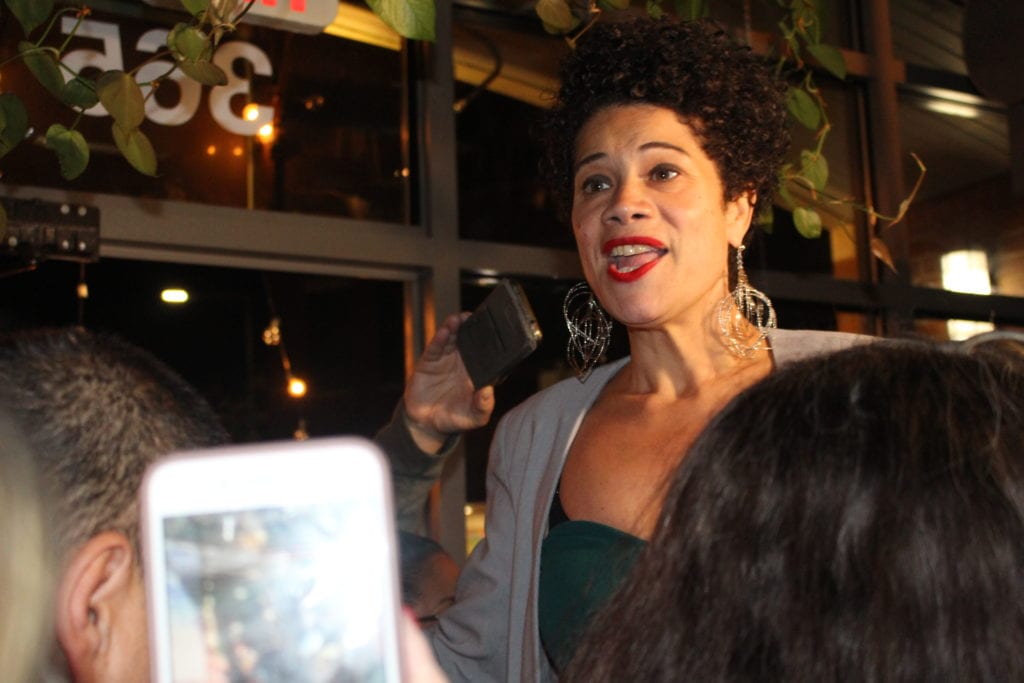Election Day over, one seat remains contested
St. Guillen calls for recount after Mejia declares victory

A swarm of supporters surrounded Boston City Council at-large candidate Julia Mejia when she declared victory at the Frogmore in Jamaica Plain on Election Night. A Dominican flag was held high, and followed Mejia around the restaurant while the crowd shouted, “Power to the people” and “Si se puede!” When she gave her victory speech, she confirmed that Mayor Marty Walsh called to congratulate her on her win, clinching the fourth at-large seat after three of the incumbents secured their spots.
Mejia and her supporters were sure she would be the first immigrant and first Latina to join the Council. This would echo similar sentiments in other victory parties across Boston: For the first time in Boston’s history, women and people of color are the majority on the council.
But less than a mile down the road, fellow candidate Alejandra St. Guillen, who had previously conceded after Walsh administration officials told her that she was down by 200 votes, decided not to back down after the gap narrowed to just 10 votes. St. Guillen, who could be the first openly gay Latina to join the Council, said in a statement she was proud of the campaign her and her team ran and was requesting a recount.
“Every voter who came out and cast a ballot — whether it be absentee, in the voting booth, or provisionally — deserves a full and complete count to determine who is our next City Councilor at large,” said St. Guillen in the statement.
According to the city’s unofficial results, there was ultimately only a 10-vote difference separating the two candidates — Mejia garnered 22,464 votes as St. Guillen grabbed 22,454. Candidates within a percentage point or two of each other commonly ask for re-counts, and Mejia and St. Guillen are just one fiftieth of a percentage point apart.
In the 2001 at-large race, Felix D. Arroyo came in 6th place with 28,551 votes, 33 votes behind Rob Consalvo. After Arroyo requested a recount, then a three-week-long process, he came out 68 votes ahead of Consalvo. When Francis “Mickey” Roache left the council after being elected Suffolk County register of deeds in 2002, Arroyo became the city’s first Latino at-large councilor.
There’s no guarantee a recount will reverse a victory recorded in the first vote count. A recount could also show an increased margin of victory for Mejia.
While St. Guillen stressed the importance of maintaining the integrity of the vote in her statement, Mejia issued a triumphal statement the day after the election, sounding a note of confidence.
“We won because communities across Boston demonstrated their power at the ballot and showed that they will no longer be ignored,” said Mejia in a statement early Wednesday morning. “I am confident that no matter the outcome, today all of Boston won.”
According to recount laws in Massachusetts, St. Guillen and a group of voters would have to petition for a recount. This petition would include 50 valid registered voter signatures from each ward, with a deadline of 5:00 p.m. on the 10th day after the election — giving St. Guillen until Friday, Nov. 15, according to officials in the city’s Election Department.
No matter the results of this potential recount, Boston will have its first ever Latina on the council after an already historic night for women and people of color.
“Regardless of what comes out of this recount, we will have a city council that reflects the demographics of this city,” St. Guillen said during a press conference Wednesday. “That’s exciting for democracy and I’m excited to live in a city that has a council that reflects its population.”
Alexa Gagosz is a staff writer for The Scope, a project of Northeastern University’s School of Journalism.
Yawu Miller contributed to this report.









